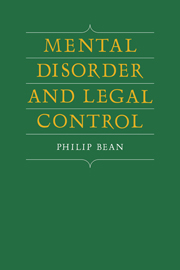Book contents
- Frontmatter
- Contents
- Preface
- Chapter 1 Mental health legislation
- Section I The admission of patients to mental hospitals
- Chapter 2 Social workers and applications
- Chapter 3 Medical recommendations and compulsory admissions
- Chapter 4 Detention of the mentally disordered in the community
- Section II Control of patients in the hospital and community
- Section III Patients' rights
- Section IV Conclusion
- Notes
- Index
Chapter 3 - Medical recommendations and compulsory admissions
from Section I - The admission of patients to mental hospitals
Published online by Cambridge University Press: 06 July 2010
- Frontmatter
- Contents
- Preface
- Chapter 1 Mental health legislation
- Section I The admission of patients to mental hospitals
- Chapter 2 Social workers and applications
- Chapter 3 Medical recommendations and compulsory admissions
- Chapter 4 Detention of the mentally disordered in the community
- Section II Control of patients in the hospital and community
- Section III Patients' rights
- Section IV Conclusion
- Notes
- Index
Summary
All societies requiring patients to be admitted to mental hospitals, whether the admissions be compulsory or not have in some way and at some time to devise procedures whereby qualified medical personnel make key decisions. It was not always so (see Scull, 1979) but the modern conception of mental disorder (or lunacy or insanity, call it what you will) has seen fit to view mental disorder as the province of medicine. The Royal Commission preceding the 1959 Act put it this way, ‘Disorders of the mind are illnesses which need medical treatment’ (HMSO, 1957, para. 5) We have tended to accept that view – not always uncritically and not always with good grace, I would add, and sometimes with a sort of sullen resignation but generally speaking without rancour. There may be debates about the quality of the medical recommendations, about the form they should take, about the timing of the medical recommendations (that is whether they should precede or follow admission), but the medical recommendations remain the cornerstone of the admission procedure.
There may also be debates about the numbers and qualifications of those who should be involved. That is, whether there should be more than one person making the medical recommendation and, if so, whether the recommendations should be made as a result of a single or joint interview. Should the medical personnel be qualified in psychiatry and, if so, at what level? Is any person qualified in medicine sufficient?
- Type
- Chapter
- Information
- Mental Disorder and Legal Control , pp. 35 - 54Publisher: Cambridge University PressPrint publication year: 1986



